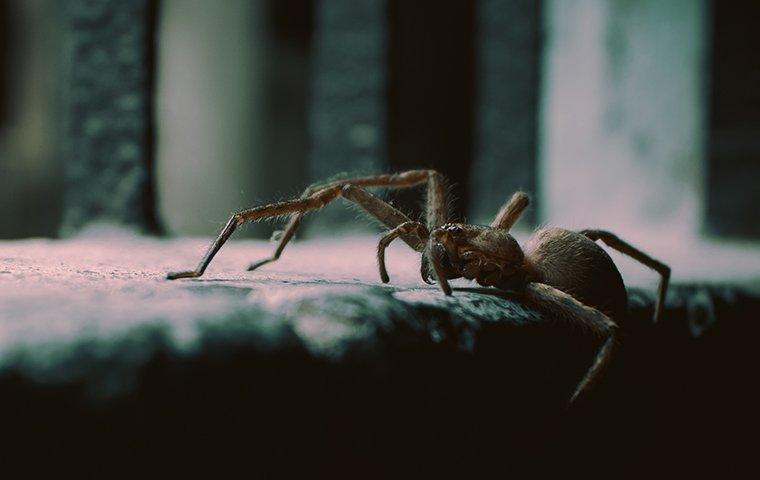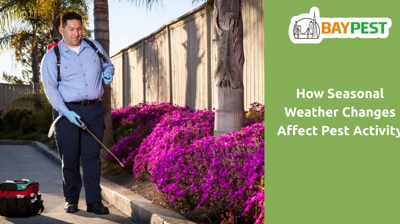The Ultimate Spider Prevention Guide For Homes In The Bay Area

Welcome to "The Ultimate Spider Prevention Guide for Homes in the Bay Area," brought to you by Bay Pest, your trusted partner in professional pest control services. In this comprehensive guide, we will equip you with valuable insights and effective strategies to keep your home spider-free. As a reputable pest control company, we understand the importance of maintaining a comfortable and pest-free environment. Join us as we explore the world of spiders, address common challenges, and provide practical prevention tips. For the best home pest control in the Bay Area, look no further than Bay Pest.
Spiders Are Not Insects But Arachnids
Spiders are not insects; they belong to a different biological group—arachnids. This distinction is fundamental in comprehending their anatomy, behavior, and overall classification within the animal kingdom.
Insects and arachnids share some similarities, such as they are both part of the larger group of arthropods, characterized by their jointed legs and exoskeletons. However, there are distinct differences between spiders versus insects that set spiders apart as arachnids:
- Body Segments: Insects typically have three main body segments: the head, thorax, and abdomen. Conversely, arachnids generally have two main body parts—the cephalothorax and the abdomen. This division is quite noticeable in spiders, where the cephalothorax houses the head and legs, while the abdomen contains vital organs and sometimes spinnerets for producing silk.
- Legs: Both insects and arachnids have multiple legs, but the number of legs varies between the groups. Insects generally have six legs, whereas spiders possess eight legs. This octet of legs is a distinctive feature of arachnids.
- Antennae: Insects typically have antennae, sensory structures on their heads that play roles in detecting environmental cues. Spiders lack antennae and instead rely on other sensory mechanisms to perceive their surroundings.
- Mouthparts: The mouthparts of insects and arachnids also differ. Insects have specialized mouthparts for biting, chewing, sucking, or lapping up food. Arachnids, including spiders, have specialized mouthparts called chelicerae adapted for grasping and piercing their prey. These chelicerae are often associated with venom glands they use to immobilize or digest prey.
- Wings: Many insects have wings that enable them to fly. Arachnids, including spiders, lack wings entirely. They move by crawling or, in some cases, using silk threads to glide on air currents.
Understanding these distinctions helps us appreciate the diversity of life on Earth and clarifies the specific characteristics that make spiders unique members of the arachnid group. This knowledge is fascinating and relevant in formulating effective spider prevention and control strategies, as their behavior and biology differ from insects in several significant ways.
Spiders In The Home Can Be Problematic
While spiders play a crucial role in maintaining ecosystem balance by controlling insect populations, their presence within residential spaces can lead to various issues and concerns. As a professional pest control company serving the Bay Area, we recognize the significance of understanding these challenges and providing factual information to address them effectively.
- Aesthetic Concerns: Spiders often build intricate webs in corners, crevices, and other hidden areas of your home. These webs can accumulate dust and debris, leading to an unsightly appearance. Additionally, spider webs can cling to surfaces, making cleaning more challenging and contributing to an overall untidy atmosphere.
- Fear and Discomfort: Arachnophobia, the fear of spiders, is one of the most common phobias among humans. Encountering spiders indoors can trigger intense fear and anxiety for many individuals, leading to feelings of discomfort and stress. This fear can also affect daily activities and routines, causing unnecessary distress.
- Venomous Species: While most spiders are harmless common house spiders or have venom that is not dangerous to humans, some species are venomous and can deliver painful or potentially harmful bites. Examples of such species include the black widow and brown recluse. Bites from these spiders can cause localized pain and swelling and, in severe cases, require medical attention.
- Health Risks: Besides the direct effects of venomous bites, spiders can indirectly contribute to health risks. Spiders often prey on other insects, and their presence can indicate an underlying pest issue. Insects like flies, mosquitoes, and ants can carry diseases and pathogens, potentially increasing the risk of disease transmission within your home.
- Allergies: Some individuals may be allergic to spider bites, leading to allergic reactions that range from mild itching and redness to severe swelling and difficulty breathing. It's important to note that allergic reactions vary from person to person, and proper identification of the spider species responsible for the bite is crucial for accurate treatment.
- Invasive Species: Certain spider species are invasive and not native to the region like the common spiders we're used to. When these species establish themselves within homes, they can disrupt local ecosystems and outcompete native species, having a cascading effect on the environment and local biodiversity.
- Recurring Infestations: Spiders are skilled at finding small openings and gaps to enter homes. Even after removing existing spiders, new spiders can quickly reinfest your home if you don't seal the underlying entry points. Effective spider prevention involves removing existing spiders, addressing the conditions that attract them, and providing long-term solutions.
Given these challenges, it's evident that managing spider populations within homes requires a multi-faceted approach. Effective prevention involves a combination of proactive measures, understanding spider behavior, and implementing strategies to reduce their presence.
As a professional pest control company, Bay Pest has the knowledge and expertise to assess your specific situation, identify the species present, and tailor solutions that align with the unique challenges posed by spiders in the Bay Area. Our commitment to delivering factual information and detailed solutions ensures that your home remains a comfortable environment without any spiders.
Naturally Effective Spider And Pest Prevention Tips
Let's explore ways to create an environment that is less attractive to spiders and other pests.
- Sealing Entry Points: Go beyond the obvious openings like doors and windows. Carefully inspect your home for small cracks or gaps that spiders and insects could use as entry points. Seal these gaps with caulk, weatherstripping, or mesh screens. Pay attention to areas around pipes, vents, and utility lines.
- Reduce Clutter and Moisture: Spiders seek cluttered and damp environments. Minimize clutter in attics, basements, and storage areas to eliminate potential hiding spots. Fix any leaks promptly to reduce moisture, as a dry environment is less appealing to pests.
- Regular Cleaning: Consistent cleaning routines can significantly reduce the presence of spiders and their webs. Regularly vacuum and dust your home, paying attention to corners, ceiling junctions, and hidden areas. This practice not only removes existing webs but also eliminates potential egg sacs.
- Outdoor Maintenance: Your home's exterior can play a role in attracting pests. Trim back vegetation close to the house, as plants touching the exterior walls and foundation can provide bridges for pests to enter. Keep firewood, debris, and shrubs away from the foundation, which can create harborage areas.
- Natural Repellents: Certain scents act as natural repellents for spiders and other insects. Peppermint oil, citrus-based sprays, and vinegar are examples of substances that can discourage pests. You can dilute these in water and spray them around windows, doors, and other potential entry points.
- Proper Lighting: Outdoor lighting can attract insects, which, in turn, will attract spiders. Consider using yellow or sodium vapor lights that are less attractive to insects. Reducing the insect population around your home can indirectly discourage spiders from establishing themselves.
- Use Essential Oils: Essential oils like lavender, eucalyptus, and tea tree oil have natural insect-repellent properties. Adding a few drops of these oils to a spray bottle with water and spritzing areas prone to pest activity can create an inhospitable environment for spiders.
- Regularly Remove Webs: Spiders build webs to catch prey, and regular removal can disrupt their hunting strategies. Use a broom or vacuum to remove webs from ceilings, corners, and other surfaces. Be cautious when handling spider webs to avoid contact with spiders.
- Proper Food Storage: Spiders and other pests are attracted to food sources. Store food in airtight containers, and avoid leaving crumbs or food residue in the open. This practice not only deters pests but also helps prevent other potential infestations.
- Pet Food Management: If you have pets, be mindful of their food and water bowls. Clean up spilled food promptly and avoid leaving food out overnight, as this can attract pests that spiders may prey on.
- Dealing with Yard Debris: Keep your yard well-maintained by regularly raking leaves, removing debris, and trimming overgrown vegetation. Piles of leaves and yard waste can create shelter for pests and serve as breeding grounds.
Implementing these natural prevention tips requires consistent effort and attention to detail. While these methods can help, they might not eliminate all types of spiders or the pest activity that attracts them. In cases where infestations are persistent or concerning, it's advisable to consult professionals like Bay Pest for a thorough assessment and tailored solutions. Our expertise in pest control ensures we complement your efforts with comprehensive strategies to maintain an environment without pests in your Bay Area home.
Contact The Professionals For Total Spider Control
While natural prevention tips can help manage spider populations, achieving comprehensive and lasting spider control may require the expertise of professionals. At Bay Pest, the best expert spider control near you, we specialize in providing effective and targeted solutions for total spider removal in the Bay Area.
Our experienced team employs industry-approved techniques to address and prevent future infestations. By partnering with us, you can ensure an environment that focuses on your comfort and peace of mind. Contact Bay Pest today for expert spider control services tailored to your needs.

Pest Control with a Personal Touch
Why Our Service Makes the Difference
-
Results-Driven
Unlimited follow-ups for 30 days after each service ensures optimal results.
-
Customizable ServiceWe customize the service and frequency to meet your Pest Control needs.
-
40+ Years of ExperienceWith over 40 years of experience, we're your best bet for Pest Control in the Bay Area.
-
Licensed, Insured, Vetted ProsEntrust your pest control needs to licensed, insured professionals.

A member of our team will be in touch shortly to confirm your contact details or address questions you may have.

Hear From Our Happy Customers
At Bay Pest Solution Inc, your satisfaction is our priority! See for yourself what our customers have to say about working with us.
-
"Great job handling pest removal!"
I would recommend Bay Pest Solution to everyone! They have done a great job handling all our pest removal issues. I'm always ...
- Denise S. -
"Friendly, punctual, thorough service"
So glad to be customers of Bay Pest Solution Inc.! They are very friendly, punctual, and thorough. Despite many other pest ...
- Alivia D. -
"Fantastic service, very professional."
As a real estate professional in the Bay Area, Bay Pest Solution Inc. is my go-to for anything pest-related. Fantastic ...
- Calmin C. -
"Full Satisfaction"
Would definitely work with them again in the future.
- Ross W. -
"Extremely Happy"
Their price on it was good and no contract.
- Ronald B. -
"Professional & Honest"
Bay Pest was the first to listen and very quickly gave me options on termination.
- Cindy B. -
"Very Knowledgeable"
Good communication, timely, friendly, great follow-up.
- Carter C. -
"Service Was Great"
Easy communication, friendly and helpful and they got the job done in one go.
- Charity S.



.png)


.2410210839369.jpg)